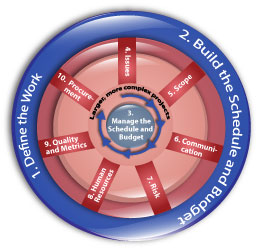![]()
3.0 Manage the Schedule and Budget
You have now defined the work (Project Charter, Project Management Plan) in Step 1 and planned how you will complete the work (project schedule, budget) in Step 2. Now you must manage the schedule and budget to ensure that the project finishes within your deadline date and within budget.
|
High-level process flow for managing the schedule |
The schedule should represent your best-guess at any particular point in time on how to complete the remaining work. The more complex your project is, the more change is going to be required in your “best guess” over time. That is why managing the project schedule is such an important project management skill. The project manager must evaluate the schedule on an ongoing basis and determine the current state of the project against the baseline schedule. Based on the current state of the project, and your current understanding of the work remaining, you need to re-plot a course that will allow the work to be completed within the original budget and deadline.
|
High-level process flow for managing the budget |
For most projects, the schedule will need to be reviewed on a weekly basis. During this review, the project manager updates the schedule with the current state of work that is completed and in-progress. The remaining work should be evaluated to see if the project will be completed within the original effort, cost, and duration estimates. If it can, you are in good shape. If it cannot, the project manager must implement corrective action.
Of all of the skills required for managing the project, managing the schedule is perhaps the most fundamental. Depending on the dynamics of your project, the project manager may be in a position of having to constantly utilize his experience and creativity to get the project completed within expectations. One week your project may be on track. The next week, you may have work assignments that are late and issues that have surfaced. If an activity on the critical path is a week late, the project manager cannot sit back idly and allow the entire project to be a week late. Instead, he must evaluate the resources and options available and get the project back on track. If you are good at it, managing the schedule can be one of the more challenging and rewarding aspects of project management. If you do not relish the detailed work that is required, you may find it much more difficult to be successful as a project manager.
Kicking Off and Closing the Project (3.0.P2)
After the project is defined and planned, the actual execution of the project can begin and the project deliverables can be created. This work is also called the project life cycle. The project life cycle is surrounded by two events – a project kickoff meeting to officially start the project execution and a set of project closure activities to officially end the project. For more details see 3.1A.3.1 Project Kickoff and 90.0 Close Project)
Integrating the Project Lifecycle and Project Management Processes (3.0.P3)

The schedule is the focal point of managing the project, and all the project management processes are integrated in the schedule. You should have activities and time allocated in your schedule for communicating, managing scope, updating the schedule and all other project management activities. The integration occurs when the project management processes touch each other, as well as when the project management and project life cycle activities overlap.
![]() 3.0.1
Integration Management
3.0.1
Integration Management
![]() 3.1A Manage the
Schedule/
Process
3.1A Manage the
Schedule/
Process
![]() 3.1B Manage the
Budget/
Process
3.1B Manage the
Budget/
Process
![]() 3.2A Manage the
Schedule /
Techniques
3.2A Manage the
Schedule /
Techniques
![]() 3.2B Manage the Budget /
Techniques
3.2B Manage the Budget /
Techniques
![]() 3.3 Manage the Schedule and
Budget /
Quick Reference
3.3 Manage the Schedule and
Budget /
Quick Reference
![]() Manage the Schedule
and Budget / Example
Manage the Schedule
and Budget / Example
[Previous - Build the Schedule and Budget / Example] [Next - 3.0.1 Integration Management]


